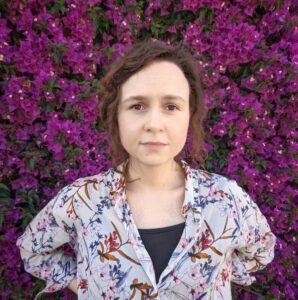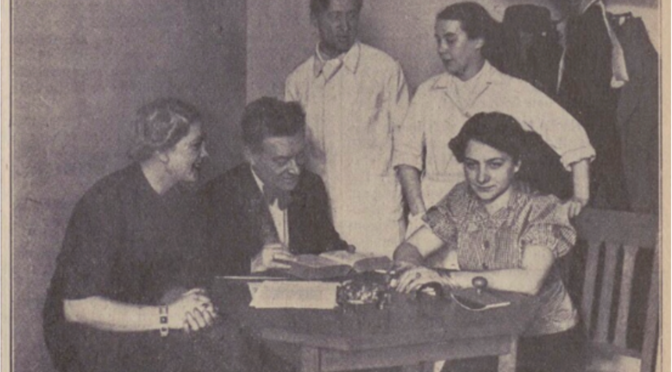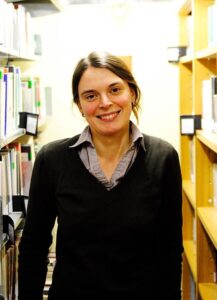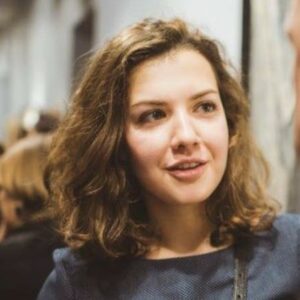“The effects and affects of the (im)mobility of men during Russia’s full-scale war against Ukraine”
Contact : Koziienko_Ruslana@phd.ceu.edu
Research Area 2 : Norms and Transgressions

Ruslana Koziienko is a social anthropologist and a doctoral candidate in the Department of Sociology and Social Anthropology at Central European University (Vienna). Her doctoral research explores the experiences of Ukrainian adult civilian men as affected by the limited mobility—outside, due to the travel ban, and within the country, due to the mobilization processes—under martial law, which was introduced in response to Russia’s full-scale invasion of Ukraine in 2022. The project focuses on three interrelated themes. First, it examines the coping strategies civilian men develop under conditions of constrained mobility in order to support and provide for themselves and their families. Second, the research analyzes the transformations of masculinities and sense of manhood civilian men have undergone, especially in the light of the masculinity of the defender occupying the hegemonic position, as well as, more broadly, how the hierarchy of masculinities in Ukrainian society has been reshaped over more than three years of the all-out war. The third theme (and the general framework) of the project explores the transformations of and contestations over citizenship and what it means to be a “good (male) citizen” in times of war. Finally, the research also looks at the dynamics, processes, and regimes at different—national, regional, and international—levels that have shaped the historical moment when the sex-selective travel ban in times of war became possible and supported, or at least tolerated, by many in the first place. Among these are the national gender order, the European migration regime, the international humanitarian regime, and the tension between, on the one hand, state sovereignty and, on the other, the international regime of human rights.
Methodologically, the research draws on online and in-person, in-depth semi-structured interviews with Ukrainian civilian men, as well as, in a few cases, their partners, in Ukraine and across nine countries (Austria, the Czech Republic, Germany, Poland, Portugal, Slovakia, Spain, the UK, and Canada). Research participants include men who remained in Ukraine, those who left the country, men who left but later returned, and those who were abroad when the full-scale invasion started. The research is also complemented by an analysis of the transformations of the law and regulations governing the border crossing regime and mobilization processes, media materials, and elements of digital ethnography.
CV
Education
- 2020 – exp. 2026: PhD candidate, Sociology and Social Anthropology, Central European University, Vienna
- 2018 – 2020: MA, Sociology and Social Anthropology, Central European University, Budapest
- 2011 – 2015: BA, Cultural Studies, National University of Kyiv-Mohyla Academy, Kyiv
Teaching experience
- 01/2025 – in progress: Certificate of Teaching in Higher Education, Central European University
- 01/2024 – 04/2024: Teaching Assistant, Central European University, Vienna, Ethnographic Methods, Asst. Prof. Johanna Markkula (MA level)
- 04/2022 – 06/2022: Mentor, Invisible University for Ukraine, Vienna, Transformation, Conflict, and Migration (mixed levels)
Publications
- Koziienko, Ruslana. 2023. “Against false solidarity. A call for true solidarity among people with experiences of displacement.” Allegra Lab, March. (Link)
- Biziukova, Volha, Ruslana Koziienko, and Anna Lazareva. 2023. “‘Arrival’ Infrastructures: Ukrainian Displaced People in Vienna.” IWM Post, no.131 (June). (Link)
- Koziienko, Ruslana. 2016. “Listening to the Rhythms of Cultural Trauma,” A Visit from Ghosts, 1 (October): 10-12. (Link)
In preparation
- Biziukova, Volha, Ruslana Koziienko, and Ayşe Çağlar. “Beyond exception: the Ukrainian displaced in Vienna and the mazes of temporary protection in the EU and global contexts.” (Advanced draft; will be submitted to Ethnic and Racial Studies)
Conference presentations
- 11 – 13/06/2025: Men and Masculinities in Transition, organized by the Nordic Association for Research on Men and Masculinities, Stockholm University; Panel: Military-2 & Prison; Presentation title: Transformations of civilian masculinities: Ukrainian men and (im)mobility during Russia’s full-scale war against Ukraine.
- 14 – 15/11/2024: Ukrainian Un/Certainties: Mobilities, Memories and Representations in Times of War, organized by Prisma Ukraїna, Berlin; Panel: Gender and (Im)Mobility; Presentation title: Contesting citizenship: (Im)Mobility of adult civilian men under martial law during the Russian war against Ukraine.
- 23 – 26/07/2024: EASA2024: Doing and Undoing with Anthropology, Barcelona; Panel: The Gender of the State; Presentation title: The effects and affects of the (im)mobility of civilian men under martial law during the Russian war against Ukraine.
- 13 – 14/10/2022: Solidarity, Displacement & the University Workshop, Berlin; Presentation title: Against false solidarity. A call for true solidarity among people with experiences of displacement.
Co-authored conference presentations:
- 04 – 05/11/2023: Dialogues of the Peripheries, online; Feuerbach 11 conference, organized by the Commons journal; Co-presented with Volha Biziukova and Ayşe Çağlar; Panel: Approved or Refused: How the international refugee system has to work? (Link)
- 30/09/2023: Migration and Arrival in Turkey: Urban and Spatial Approaches, Istanbul, organized by ReROOT Project; Co-presented with Volha Biziukova and Ayşe Çağlar; Presentation title: Arriving in “perpetual temporariness”: the displaced from Ukraine in Vienna and the mazes of temporary protection.
- 01 – 02/03/2023: Cities and Human Mobility Research Collaborative Research Symposium, Vienna; Co-presented with Volha Biziukova; Presentation title: “Arrival” Infrastructures of the Displaced from Ukraine in Vienna.
Public talks and presentations:
- 13 – 15/06/2025: Participant, conference Einsam in der Neuen Welt (Lonely in the New World); Project Group Central, Eastern, and South-Eastern Europe, The Evangelical Academy, Tutzing, Germany.
- 22/02/2024: Invited speaker, public discussion War, Flight and Civil Society. The Ukrainian perspective; Dialogue Office for Civil Society Cooperation, Vienna, Austria.
- 09/11/2023: Presentation of research findings and invited speaker, public discussion What’s next for Ukrainian refugees? Lived experiences between state “welcome infrastructures” and self-help ecosystems; Research Center for the History of Transformations (RECET), Vienna, Austria.
- 22/02/2023: Presentation of key findings of the research “Arrival” Infrastructures of the Displaced from Ukraine in Vienna, Central European University, Vienna, Austria; Co-presented with Volha Biziukova, Ayşe Çağlar, and Anna Lazareva.
- 09/02/2023: Presentation of key findings of the research “Arrival” Infrastructures of the Displaced from Ukraine in Vienna, Institute for Human Sciences (IWM), Vienna, Austria; Co-presented with Volha Biziukova. (Video)
Conferences/workshops organized
- 08/07/2025: Un/Making Protection: The Proliferation of Temporary Protection Regimes Across Space and Time, co-organizer, Institute for Human Sciences (IWM), Vienna, Austria.
- 17 – 18/10/2024: EthnoDoks: 16th Edition, co-organizer, Vienna, Austria. (Link)
Other work experience
- 2015 – 2019: Visual Culture Research Center, Kyiv, Ukraine; Project manager, researcher, co-curator
- 2015 – 2016: The National Art Museum of Ukraine, Kyiv, Ukraine; Research Associate in the Education Department
- 08/2015 – 10/2015: The School of Kyiv (Kyiv Biennial 2015), Ukraine; Coordinator
Exhibitions
- 05/2017 – 07/2017: Custodial Settings, co-curator, Visual Culture Research Center, Kyiv (Link)
- 11/2016 – 04/2017: Points of Approaching, co-curator, CSM/Foundation Centre for Contemporary Art, Dnipro-Kharkiv-Kyiv (Link)
- 11/2016 – 12/2016: KINOTRON: Exhibition of an Unrealized Idea. Felix Sobolev – Stanisław Lem – Viktor Glushkov, co-curator, Visual Culture Research Centre, Kyiv (Link)
- 08/2016: Olympics’84 in Donetsk, co-curator, Visual Culture Research Centre, Kyiv (Link)




 Eva Krásová teaches theory of literature at the Institute of Czech Literature and Comparative Studies at the Faculty of Arts, Charles University in Prague.
Eva Krásová teaches theory of literature at the Institute of Czech Literature and Comparative Studies at the Faculty of Arts, Charles University in Prague.